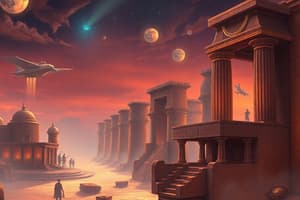Podcast
Questions and Answers
What is associated with Week 1?
What is associated with Week 1?
- The Flood and the Tower of Babel (correct)
- Jesus the Messiah
- Norman Conquest and Feudalism in Europe
- Seven Wonders of the Ancient World
Which of the following events occurred in Week 2? (Select all that apply)
Which of the following events occurred in Week 2? (Select all that apply)
- Seven Wonders of the Ancient World (correct)
- Genghis Khan Rules the Mongols
- Jews Return and Rebuild the Temple
- Babylon Falls to Persia
What major event is related to Week 5?
What major event is related to Week 5?
- Norman Conquest and Feudalism in Europe
- Judah Falls to Babylon (correct)
- Pentecost and the Early Church
- Age of Information and Globalization
In Week 8, which figure completed the Vulgate?
In Week 8, which figure completed the Vulgate?
What event marks the beginning of the Age of Exploration?
What event marks the beginning of the Age of Exploration?
What period is known for Napoleon being crowned Emperor of France?
What period is known for Napoleon being crowned Emperor of France?
Who was a significant leader during the U.S. Westward Expansion?
Who was a significant leader during the U.S. Westward Expansion?
Which war is associated with Week 19?
Which war is associated with Week 19?
Which president was in office during World War II?
Which president was in office during World War II?
Match the following U.S. Presidents with their corresponding events:
Match the following U.S. Presidents with their corresponding events:
Flashcards are hidden until you start studying
Study Notes
Age of Ancient Empires
- Represents the foundational period of human civilization spanning significant events like Creation, the Flood, and the Tower of Babel.
- Key civilizations include Mesopotamia and Sumer, the Egyptians, and the Indus River Valley Civilization.
- Notable early cultures also include the Minoans and Mycenaeans.
Notable Ancient Events and Civilizations
- Seven Wonders of the Ancient World highlight achievements in architecture and engineering.
- Important figures include the patriarchs of Israel, with Canaanites, Hittites, and Kush contributing to regional dynamics.
- The rise of Assyrians and Babylonians marks powerful empires in the ancient Near East.
Cultural Developments
- The emergence of Hinduism reflects the spiritual landscape of India during this period.
- The Phoenicians significantly influenced language development via their alphabet.
- The Israeli journey included crucial events like the Exodus and subsequent conquest under judges.
Transition and Division
- Early Native Americans represent diverse cultures before European contact.
- Israel's division into two kingdoms led to significant historical ramifications.
- The founding of Rome by Romulus and Remus illustrates legendary beginnings of one of history's greatest empires.
Wars and Reconstruction
- Key conflicts such as the Peloponnesian Wars and Punic Wars shaped ancient civilizations, particularly Greece and Rome.
- The destruction of the Jewish Temple marks a pivotal point for Jewish history post-exile.
- The rise of the Roman Republic adopts elements like governance and warfare that influence future structures.
Religious and Philosophical Advances
- The life of Jesus marks a cornerstone of Christianity, followed by key developments such as Pentecost.
- Important philosophical movements emerged with thinkers like Lao-Tzu, Confucius, and Buddha influencing Eastern thought.
Transition to the Middle Ages
- The fall of the Roman Empire to barbarian invasions set the stage for systemic change in Europe.
- The emergence of the Byzantine Empire under Justinian preserves and builds upon Roman legacies.
- The spread of Islam initiated by Muhammad significantly impacts global culture and trade.
Age of Exploration and Enlightenment
- Columbus's voyage symbolizes the beginning of the Age of Exploration, leading to cultural exchanges and colonialism.
- The Protestant Reformation reshaped European society, politics, and religion, setting foundation for modern Western thoughts.
- Enlightenment thinkers promote ideas of reason, individualism, and science, influencing revolutions globally.
Modern History and Globalization
- World Wars I and II significantly alter global dynamics, leading to the establishment of organizations like the United Nations.
- Movements for civil rights, independence, and social reforms shape contemporary society.
- Events like September 11, 2001, and the fall of communism in Eastern Europe represent pivotal moments in recent history.
U.S. Presidents
- The evolution of leadership in the United States spans from George Washington to Barack Obama, showcasing political shifts, societal challenges, and historic milestones.
- Presidential policies and events, such as the New Deal and civil rights legislation, illustrate the dynamic nature of governance and social change in American history.
Studying That Suits You
Use AI to generate personalized quizzes and flashcards to suit your learning preferences.




